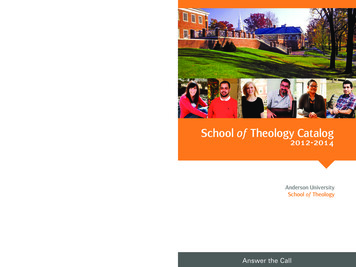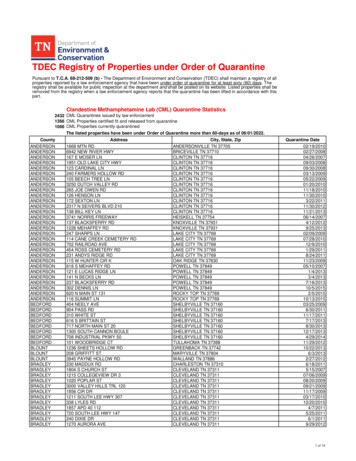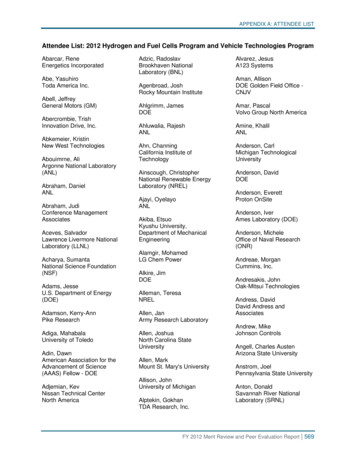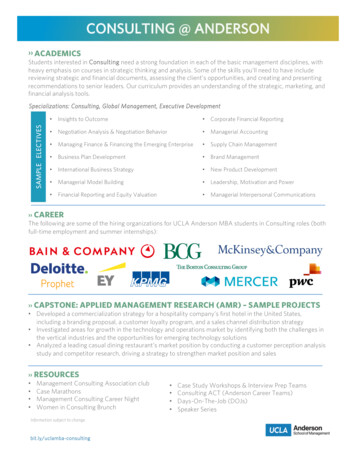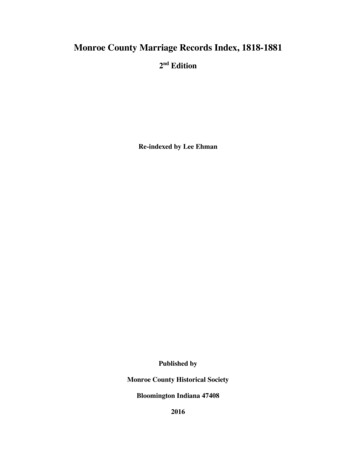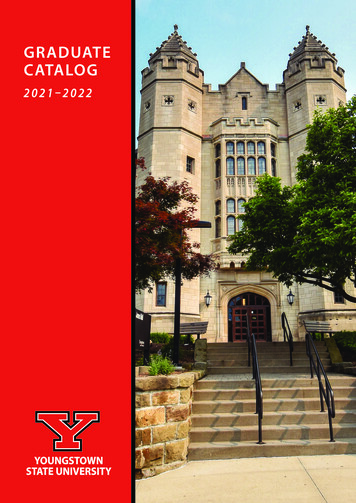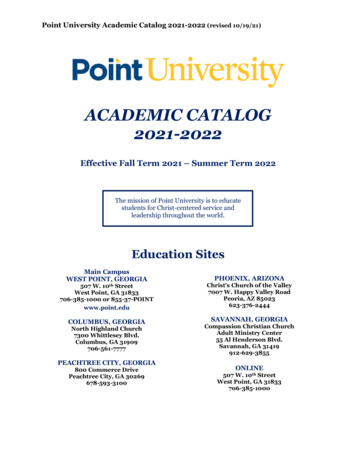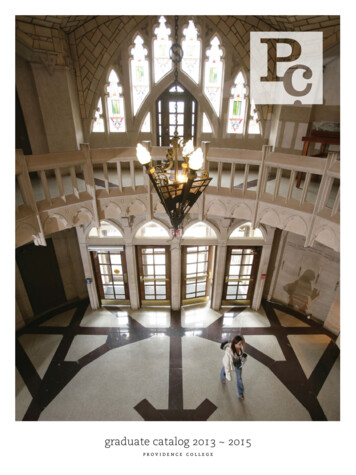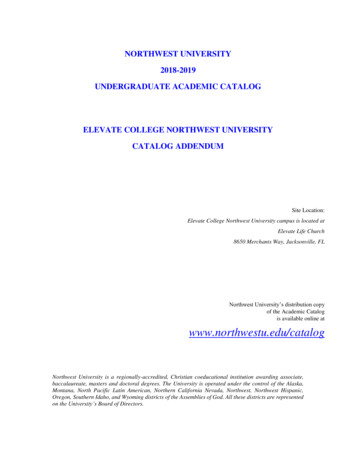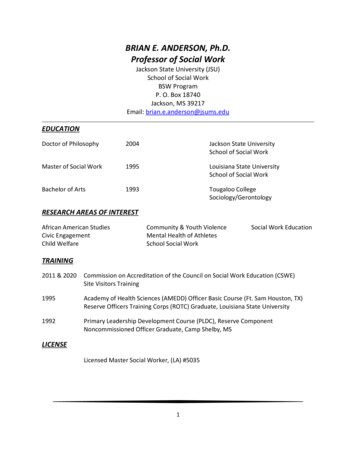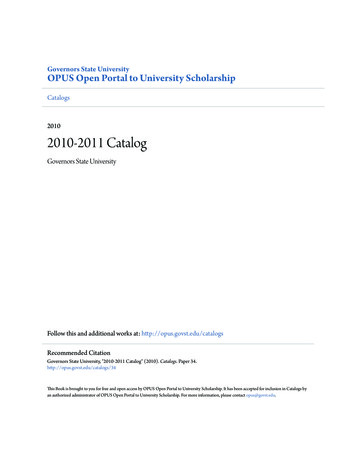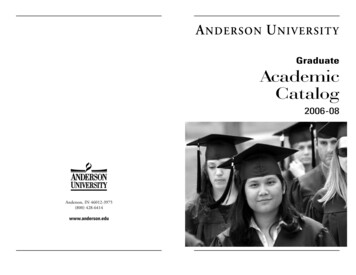
Transcription
A NDERSON U NIVERSIT YGraduateAcademicCatalog2006-08Anderson, IN 46012-3975(800) 428-6414www.anderson.edu
Bulletin2006-08ANDERSON UNIVERSITYGRADUATE PROGRAMSAnderson UniversityAnderson, IndianaVol. 4, 2006. Published by Anderson University, Anderson, IN 46012.Member, North Central Association of Colleges and Schools.The material contained in the Anderson University Graduate Academic Catalog is for information only and does notconstitute a contract between the student and the university. The catalog provides an overview of course offeringsand content. It is not the official list of offerings for any given term. Students should consult the course schedulefor the specific term(s) for which they wish to register. The university and its various units reserve the right to revise,amend, alter, and change from time to time its policies, rules, regulations, and financial charges, including thoserelated to admission, instruction, and graduation, without notice to students. The university reserves the right towithdraw curricula and specific courses, alter course content, change the calendar, and withdraw or change programs and majors offered by the university without notice to students.Anderson University is a not-for-profit exempt organization as described in Section 501(c)(3) of the InternalRevenue Code. In compliance with the Civil Rights Act of 1964 and 1991, and Title IX of the EducationalAmendments of 1972, the university does not discriminate on the basis of race, color, national origin, age, sex, orveteran status in its policies, practices, or procedures. The university maintains a policy of non-discrimination onthe basis of disability in its educational programs, admissions procedures, and its employment practices, in compliance with Section 504 of the Rehabilitation Act of 1973 and the Americans with Disabilities Act of 1990. Underthe Personal Responsibility and Work Opportunity Reconciliation Act of 1996, the university reports requiredinformation on newly hired employees to the state. The university is committed to providing for student andemployee safety and health, and right-to-know laws under the provisions of the 1970 Occupational Safety andHealth Act. The university maintains compliance with the Drug Free Schools and Campuses Act of 1989 and theDrug Free Workplace Act of 1988. The student’s right of privacy in regard to disclosure of personal data is assuredin conformity with existing legislative requirements.12
CONTENTSANDERSON UNIVERSITY MISSION STATEMENTADMISSIONS . 6The mission of Anderson University is to educate people for a life of faith and service in the church and society.Established and sustained within the free and open traditions of the Church ofGod, this university is committed to being a teaching-learning community of the highestorder, engaged in the pursuit of truth from a Christian perspective.We intend to graduate students with a global perspective who are competent, caring, creative, generous people of character and potential.We will build those quality programs that will enable each member of the university to become stronger in body, mind, and spirit; to experience what it means to loveGod and neighbor; and to adopt Christ-like servant ways in all of life.TRANSFER OF CREDIT . 7ACADEMIC MISSION STATEMENTPROGRAM REQUIREMENTS . 7Anderson University aspires to assist students in their quest not only for knowledgeand useful skills, but also for maturity in understanding personal values and Christianfaith. Our curricular design and community life seek to combine the honesty and rigorof academic inquiry with the perspective and mission emerging from biblical revelationand the continuing ministry of the Holy Spirit.As a community of learners, we are committed to establishing an environment thatwill develop the whole person, strengthen both academic and social relationships, andvalue a tradition of service modeled upon the life of Jesus.As a teaching institution, we value, support, and encourage the exchange of knowledge that highlights the freedom of the mind through inquiry and emphasizes theimportance of individual worth and personal faith.As a church-related institution, we recognize the responsibility to pursue with theChurch of God and other communities of faith questions of truth, value, meaning,morality, vocation, and service.As a liberal arts institution, we are dedicated to cultivating in each individual anawareness of the physical world and a global perspective, a sense of history and an appreciation of culture, a spiritual maturity with a social conscience, and a love of learning forits own sake.As a comprehensive institution, we seek to prepare thoughtful people at the undergraduate and graduate levels who will contribute to the betterment of their communities.MISSION STATEMENT . 4ACCREDITATION . 4GRADUATE PROGRAMS . 5GRADUATE STUDENT SERVICES .6STUDENT RIGHTS AND RESPONSIBILITIES . 6REGISTRATION PROCEDURE . 7GRADING SYSTEM . 7GRADE APPEALS AND ACADEMIC PROBATION . 8REPEATING A COURSE . 8CULMINATING EXPERIENCE . 8FINANCIAL AID . 8WITHDRAWAL PROCEDURE .9GRADUATION REQUIREMENTS . 9DOCTOR OF BUSINESS ADMINISTRATION PROGRAM . 11MASTER OF BUSINESS ADMINISTRATION PROGRAM . 16MASTER OF EDUCATION PROGRAM. 19TEACH FOR INDIANA PROGRAM .26MASTER OF MUSIC EDUCATION PROGRAM .27ACCREDITATIONS AND RELATIONSHIPSFACULTY . 43Anderson University is accredited by the North Central Association of Colleges andSchools. The School of Theology is also accredited by the Association of TheologicalSchools. In addition, professional and program accreditation has been granted by theNational Council for the Accreditation of Teacher Education (undergraduate program), theAssociation of Collegiate Business Schools and Programs (undergraduate and graduate programs), the National League for Nursing, the National Association of Schools of Music,the Council on Social Work Education, and the National Athletic Trainers Association.34MASTER OF SCIENCE IN NURSING - MASTER OF BUSINESS ADMINISTRATION. 37ADMINISTRATION . 40TRUSTEES . 41
Anderson University also holds memberships in the American Association ofUniversity Women, the Coalition for Christian Colleges and Universities, the CincinnatiCouncil on World Affairs, the Institute of International Education, IndependentColleges of Indiana, Associated Colleges of Indiana, the Indiana Conference on HigherEducation, and the Indiana Consortium for International Program. It cooperates activelywith the Urban Life Center and Wesleyan Urban Coalition of Chicago. It cooperateswith Purdue University to offer special programs in applied technology fields.Anderson University students come from a wide variety of backgrounds and geographic locations. The university is authorized under federal law to enroll non-immigrant alien students. International students enrich the community with their own pointsof view and culture. Consequently, students find themselves immersed in a cosmopolitanenvironment alive with opportunities for learning. It is expected that students will beaccepted on their own merits, without respect to wealth, position, sex, or color.The university urges students to maintain high academic standards. Careful attention has been given to bringing together a faculty of academic, experiential, and personalcompetence. Scholastic standards are maintained with the expectation that students willdiscipline themselves to achieve their best work.In welcoming students of all nationalities, races, and faiths, Anderson Universityaspires to treat each student as an individual. All student services — orientation, counseling, housing, testing, activities, student financial assistance, employment, Tri-S,health, placement, and religious life — are closely coordinated in an attempt to dealwith each individual as a whole person. A significant objective is to increase the student’sself-insight and self-discovery and to assist in the intellectual, social, aspirational, andspiritual development of the student.ORGANIZATION OF GRADUATE STUDIESThe Graduate Council is charged with forming academic policy for graduate programs other than those offered by the Anderson School of Theology. The council is elected by the faculty and includes program directors, elected members, and deans of schoolswith graduate programs. A chair is appointed by the vice president for academic affairs. Itis empowered to establish policy and to review existing policies, recommending changeswhen needed. It may initiate studies and research related to graduate-level programming.The council is also charged with maintaining and reviewing the graduate curriculum. It is responsible for ruling on requests by program directors to add or delete coursesin their respective programs, on changes in program requirements, and on new programs.GRADUATE PROGRAMS OFFEREDAnderson University offers a Master of Business Administration, a Master ofEducation in Curriculum and Instruction, a Master of Education in School Leadershipand Administration (LEAD), a Doctor of Business Administration, a degree combining aMaster of Science in Nursing and a Master of Business Administration, and a Master ofMusic Education. This catalog describes the programs, curricula, and courses. Programchanges may be made in years the catalog is not published.5GRADUATE STUDENT SERVICESGraduate school staff members from the sponsoring degree programs are availableto help students throughout their graduate education careers. Assistance with registration, advising, course scheduling, and other matters is provided through the school inwhich the degree candidate is enrolled. All facilities, academic services, and student lifeservices of the university are open to graduate students. These include NicholsonLibrary, the Career Center, Kissinger Learning Center, Campus Ministries, CounselingServices, the Tri-S program, student activities, and recreational facilities. (See StudentLife Handbook.)STUDENT RIGHTS AND RESPONSIBILITIESGraduate students are afforded all the rights and responsibilities applicable to undergraduates. Graduate students are asked to support and promote the values of AndersonUniversity, including those issues involving ethics, the code of conduct, and academicintegrity. The Student Life Handbook, which outlines the policies and expectations, is available from the Office of the Dean of Students.ADMISSIONSApplicants are expected to take a nationally standardized exam determined by thediscipline. International students must also take the TOEFL exam. Prospective students must provide transcripts and recommendations with their applications.A baccalaureate degree from a regionally accredited institution is prerequisite to allmaster’s degree programs at Anderson University. A 2.75 GPA (out of 4.0) in theundergraduate degree program is required for admission. Provisional status may beoffered to students who need to complete any prerequisite courses.Applicants who have not submitted complete admission materials and those whohave not yet officially been admitted to selective master’s degree programs may begranted conditional admission. Students will be notified of conditions that must bemet at the time of admission. If the student does not fulfill conditions for admissionwithin the specified time (usually one academic semester), the student may be suspended from subsequent registration in graduate studies.Prospective students should request application materials from the director of theprogram and submit completed forms, with a non-refundable application fee, to thedirector of the program in care of Anderson University: for education, nursing, ormusic graduate programs, write to 1100 E. Fifth St., Anderson, IN 46012; for business, write to 1303 E. Fifth St., Anderson, IN 46012.The policy of Anderson University is to operate without discrimination on thebasis of age, race, gender, disability, ethnic background, or national origin.6
TRANSFER OF CREDITThe transfer of graduate credit is not automatic. Students must obtain the writtenconsent of their program director before credit earned at other institutions will beadded to the student’s records. Only grades of B or above will be considered for transfer to Anderson University. In general, no more than six hours may be transferred intothe program. Any appeal for transfer credits should be made to the AppealsCommittee of the Graduate Council.PROGRAM REQUIREMENTSCourse loads for students will be determined by the program director in the discipline. Cross-captioned (4000/5000) courses that apply to the degree shall not constitute more than 25 percent of course requirements. All other courses will be at least atthe 5000/6000 level.The student is expected to attend all classes unless prevented by an extenuatingcircumstance. Effective learning in a university requires active involvement of both thestudent and the teacher. Inasmuch as students are responsible for the learning that maydevelop, both in class and elsewhere, students should anticipate necessary absences andadvise their instructors of such absences as far in advance as possible. Specific attendance policies for individual courses are determined by instructors, according to thenature of the course, and placed in the syllabus. Students must accept responsibility forfulfilling all course requirements.An incomplete grade (I) allows a student to complete required work after the endof the semester by written agreement between the instructor and the student. Anincomplete grade must be filed with the Office of the University Registrar beforegrades are processed. The I becomes an F at the end of the fifth week of the followingsemester if not removed. Final grades are based upon the total work in the course.GRADE APPEALSStudents who believe they have not been graded fairly and wish to appeal mustinitiate that appeal process within 30 days after the grade has been received. Theappeals process consists of the following steps:1. Discuss the grade in question with the instructor.2. Consult with the director of the graduate program in which the student isenrolled.3. Consult with the dean of the college of the sponsoring graduate program.4. Approach the chair of the Graduate Council, who will appoint an appeals committee consisting of one graduate student and three faculty members from thecouncil.ACADEMIC PROBATIONREGISTRATION PROCEDUREStudents with a cumulative GPA lower than 3.0 will be placed on academic probation. After two semesters on probation, students may be dropped from the program.A final decision will be made by the vice president for academic affairs.Entering students select courses or sequences based on the advice of the appropriate program director or a graduate adviser in light of placement tests.REPEATING A COURSEA graduate student may choose to repeat a course in which the earned grade wasC or lower. The second grade will apply to the GPA.GRADING SYSTEMThe minimum passing grade in any class is a C. Students must maintain a cumulative 3.0 GPA in all courses applicable to the degree. The grading scale is as follows:GRADECREDIT POINTSAAB BBC 00CULMINATING EXPERIENCEAll programs require a culminating experience focused on evaluation or summative activities such as creative projects, theses, portfolios, exams (oral or written), orcourse work.FINANCIAL AID PROGRAMFinancial aid to students will be program-specific. Some students may be eligiblefor government loans, grants, or teaching assistantships. All financial aid will beadministered through the AU Office of Student Financial Services.WITHDRAWALINCOMPLETEAUDITCREDIT/NO CREDIT78
WITHDRAWAL PROCEDUREA graduate student who finds it necessary to withdraw from AU while classes arein session is required to complete the withdrawal process through the program directorand the Business Office. Refundable fees will be prorated according to the establisheduniversity schedule.First week of classesSecond week of classesThird week of classesFourth week of classesFifth week of classesSixth week of classes (and following)90 percent refund80 percent refund60 percent refund40 percent refund20 percent refundno refundDECLARATION OF A CATALOGStudents normally will meet the requirements of their matriculation catalog. If astudent wishes to use the graduation catalog instead, the student needs to request anofficial change of catalog from the program director. A student has five years after thematriculation date to complete their degree program. Students may petition the program director for an extension up to an additional two years. A student’s catalogexpires seven years after the matriculation date. If a student’s catalog has expired, therequirements of the graduation catalog must be met.Master of Science in Nursing - Master of Business Administration. Completionof 54 hours of course work, with 23 hours of nursing courses, and 31 hours of business courses. A cumulative 3.0 GPA in all work, submission of work portfolio, payment of all tuition and fees, and completion of all requirements within five years.Doctor of Business Administration. All course work must be completed withinsix years of when the first doctoral course is taken at Anderson University. All coursework must be completed with a cumulative GPA of 3.0 or better. A maximum of twogrades below B- in course work taken at Anderson University can be counted towardthe fulfillment of requirements. Successful completion of qualifying exams, successfulcompletion of a dissertation proposal defense, and successful completion of a dissertation in the student’s major field are required. Dissertation must be completed withinthree years of when course work is completed.Master of Music Education. Completion of 32 hours of course work, with 20hours of required core courses; 12 hours of elective courses in choral, instrumental, orgeneral music; and a thesis. Student will satisfy written and oral comprehensive examination requirements. A cumulative 3.0 GPA in all work is required.GRADUATION REQUIREMENTSMaster of Business Administration. Completion of 37 hours of required coursework. A cumulative 3.0 GPA in all work, submission of work portfolio, payment of alltuition and fees, and completion of all requirements within five years.Master of Education in Curriculum and Instruction. Completion of 36 hours ofcourse work, with 24 hours of core courses, and an additional 12 hours of electives. Acumulative 3.0 GPA in all work, portfolio of work to be reviewed by faculty and presented in a forum to colleagues and faculty, payment of all tuition and fees, and completion of all requirements within five years.Master of Education in School Leadership and Administration. Completion of30 hours of core courses and an additional six hours of electives. A cumulative 3.5 GPAin all work, successful completion of the IASP Aspiring Principal professional development, successful completion of a school leadership portfolio, a two-semester internship(while working), and successful completion of the School Leadership LicensureAssessment (SLLA).910
GRADUATE PROGRAMSDOCTOR OF BUSINESS ADMINISTRATIONThe Anderson University DBA is a Doctorate of Business Administration designed forthe unique needs of a group of business instructors not effectively served by current doctoral programs. It is a program that will link the applied nature of an MBA with the conceptual framework and research traditions that support business practice.The DBA offers the unique advantage of high-level thinking and discussion about theintegration of a Christian world view with learning. This program brings together studentsand faculty aspiring for greater effectiveness in undergraduate and graduate classrooms. Itwill familiarize students with research methods and quantitative analysis, and equip students to use appropriate tools to conduct research. The nature of the research is likely to bemore applied than is often found in doctoral programs in business.ADMISSION REQUIREMENTS A completed master’s degree from an institution that is regionally accredited. A minimum of 30 hours of graduate course work in a business-related field. A combination of the applicant’s graduate grade point average (GPA) andGraduate Management Admittance Test (GMAT) score will be used to evaluateacceptance for admission. Preference would be for the graduate GPA to be at a3.5 level or above (on a 4.0 scale) and that the GMAT score be at 600 or above.The GMAT must have been taken within the last five years. Three years of combined teaching and/or other professional work experience. Three letters of recommendation with one submitted from the currentsupervisor. (If currently teaching one of these letters must be from the departmentchairperson or the school dean). A personal interview with the DBA program director and/or other DBA facultymembers. This interview may be in person or by telephone. Computer capability and access as delineated by the DBA director.DEGREE REQUIREMENTSResearch CoreApplied StatisticsResearch MethodsAdvanced Research Methods9 hours3 hours3 hours3 hoursEducation/Teaching CoreDevelopment and Role of Christian Higher Education“Best Practices” in College TeachingFoundations of Applied Ethics9 hours3 hours3 hours3 hours11Conceptual Foundations Core(9 hours for Core, 3 hours toward major)Conceptual Foundations of ManagementConceptual Foundations of MarketingConceptual Foundations of EconomicsConceptual Foundations of Accounting/Finance9 hoursMajor Course WorkConceptual Foundations in Management, Marketing,or Accounting/FinanceSeminar in Management, Marketing, Accounting, or FinanceGlobal Business PracticesAdvanced Applications of Ethical Reasoning inManagement, Marketing, Accounting, or FinanceTeaching Practicum in Management, Marketing,Accounting, or FinanceAdvanced Topics (Discipline Based)18 hours3 hoursTotal Required AU Course WorkDissertationAdditional Graduate Hours(Transferred in at start of program)TOTAL HOURS45 hours15 hours3 hours3 hours3 hours3 hours3 hours3 hours3 hours3 hours3 hours30 hours90 hoursQUALIFYING EXAMINATION POLICIESAll DBA students must successfully complete qualifying exams before being admitted todoctoral candidacy status.Eligibility: The doctoral student is eligible to take the program qualifying examination aftercompletion of all course work requirements. Request for an exception to this must be submitted in writing to the program director.Notification: You must notify the program director of your intent to take the qualifyingexamination in a given year. This notification must occur at least four weeks prior to theadministration of the exam.Dates: The exams will be conducted on the second and third weekends of June each year.Exam Format: The DBA program is designed for you to develop several areas of expertise.Your expertise in general business areas or topics will be measured in the first weekend ofqualifying exams. Your expertise related to your academic discipline or major will be measured in the second weekend of qualifying exams. Your expertise in your specific area ofinterest or focus will be measured in the dissertation process.12
Oral Defense: All students will be required to orally defend their written answers in personbefore the DBA Exam Committee unless granted a waiver by this same committee. Waiversmay be granted based on the quality of your written responses. Waivers may cover Part 1,Part 2, or the total submitted examination. Students will be notified of their need to schedule an oral defense by the director of the DBA program.BSNS 7100 Foundations of Applied Ethics3 hoursA year-long study with a faculty mentor designed to encourage the individual studentto explore her/his personal values and beliefs as they relate to the discipline, and toestablish the scholarly implications of that belief structure in the teaching/learningprocess both in the classroom and as a research agenda.Details of exam format are available from the DBA program director.BSNS 7110 Global Business Practices3 hoursSeeks to critically examine academic research on international business. The primaryfocus is on the organizational structures, strategies, and operations of multi-nationalenterprises (MNEs). The topics are intimately linked to MNE’s international tradeand investment activities, which in turn, are significantly influenced by the diversepolitical environments in which the companies operate. This course systematicallydevelops each of these major subject areas, and shows the interconnections amongthem. Coverage will include historical and current trends with an emphasis on thedevelopment of theory.GRADUATION REQUIREMENTS All course work must be completed within six years of when the first doctoralcourse is taken at Anderson University. All course work must be completed with a cumulative GPA of 3.0 or better. A maximum of two grades below B- in coursework taken at AU can be countedtoward the fulfillment of requirements. Successful completion of qualifying exams. Successful completion of a dissertation proposal defense. Successful completion of a dissertation in the student’s major field. Dissertation must be completed within three years of when course work iscompleted.DBA COURSE DESCRIPTIONSBSNS 7010 The Development and Role of Christian Higher Education3 hoursProvides a historical context for the role of Christian higher education and explores thephilosophies of education found in the Christian college/university. Of interest will bethe fit of business programs and curricula in these institutions with discussion of trendsand future thinking. Models for exploring what makes the Christian college/universitydistinctive as part of the greater higher education community will be considered.BSNS 7050 Conceptual Foundations of Management3 hoursBSNS 7060 Conceptual Foundations of Marketing3 hoursBSNS 7070 Conceptual Foundations of Economics3 hoursBSNS 7080 Conceptual Foundations of Accounting/Finance3 hoursProvides a conceptual framework for the study and teaching of each foundational discipline through a critical review and analysis of historical and current research.BSNS 7700 Applied Statistics3 hoursStatistical techniques and methods are used to analyze, interpret, and present dataincluding, but not limited to, descriptive statistics, hypothesis testing, probability distributions, sampling, analysis of variance, correlation, and linear regression.BSNS 7710 Research Methods3 hoursPresents a basic grounding in research methods available to business scholars.Students will examine, discuss, and use these methods in class assignments.BSNS 7720 Advanced Research Methods3 hoursUses a structured environment to assist with the preparation of the student’s dissertation proposal. This course should be taken just prior to the preparation ofyour dissertation. Students must have the consent of the DBA director to enroll.BSNS 7851 Teaching Practicum in Management3 hoursBSNS 7852 Teaching Practicum in Marketing3 hoursBSNS 7853 Teaching Practicum in Accounting3 hoursBSNS 7854 Teaching Practicum in Finance3 hoursA year-long supervised experience focusing on the identification and applicationof best teaching/learning practices in the student’s discipline.BSNS 7090 “Best Practices” in College Teaching3 hoursExamines the evolving role of the professor in the teaching/learning process. Researchstudies will serve as a primary tool to encourage students to discover the most effectivepedagogical approaches for their disciplines and their classrooms.BSNS 7901 Seminar in Management3 hoursBSNS 7902 Seminar in Marketing3 hoursBSNS 7903 Seminar in Accounting3 hoursBSNS 7904 Seminar in Finance3 hoursPresentations and discussions of literature dealing with the theory and practice ofthe discipline. Includes the preparation and presentation of students’ original work.1314
BSNS 7911 Seminar: Adv. Applications of Ethical Reasoning in Management 3 hoursBSNS 7912 Seminar: Adv. Applications of Ethical Reasoning in Marketing3 hoursBSNS 7913 Seminar: Adv. Applications of Ethical Reasoning in Accounting3 hoursBSNS 7914 Seminar: Adv. Applications of Ethical Reasoning in Finance3 hoursUtilizing foundational material from common disciplines in the study of business, these seminars address the impact of these fields of study
Colleges of Indiana, Associated Colleges of Indiana, the Indiana Conference on Higher Education, and the Indiana Consortium for International Program. It cooperates actively with the Urban Life Center and Wesleyan Urban Coalition of Chicago. It cooperates with Purdue University to offer special programs in applied technology fields.
